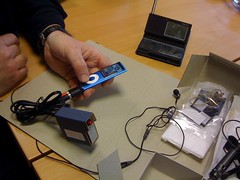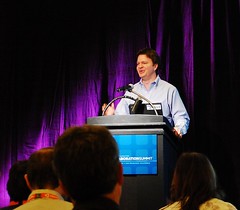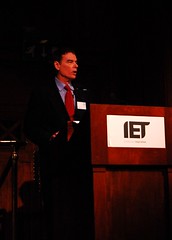Planet maemo: category "feed:dd4bc4e991792293cefbd23b49580355"


Yesterday I returned to the UK after my trip to San Francisco was extended by a week due to this Icelandic volcano business. It still feels a bit science fiction to be talking of global disruption due to a volcano, and all this talk of repatriation feels similarly odd. One minute I’m on a business trip, and the next there is a government emergency committee, Whitehall meetings, the Navy on standby and plans afoot for Dunkirk-style relief missions.
It’s reassuring to know that the British Government considers it their duty to ensure that in the event of an international emergency subjects are provided with safe passage home. This is something that we – certainly in the West, at least – take for granted and give little thought to. As we complain about the levels of taxation, and idly consider the merits of emigrating to somewhere where this is lower and the climate perhaps warmer, we should consider this little used but invaluable benefit, alongside things such as the much-maligned but wonderful-and-amazing-it-works-at-all National Health Service.
As it happens my repatriation was neither government-assisted nor particularly exciting. All credit must go to my boss’s assistant, who must have spent an awful lot of time on hold to AMEX travel. Since I was traveling on business my extended stay was not physically uncomfortable either. I wish I could say it were not mentally so, and that I were able to heed the suggestions from friends, family and colleagues that I should relax and make the most of it. However, it meant that I missed an event that I’d spent some months organising and a rather important and impossible to reschedule meeting for an out of work project. Add to this that it looked as though I could have been delayed for a number of weeks and missed the inaugural Open Source Hardware User Group meeting and a short family trip, and that I find it very difficult to relax when I find myself restricted by a situation over which I have no control and limited insight.
Volcano-related inconvenience aside, my trip to San Francisco was both productive and, overall, enjoyable. More in forthcoming posts.

Well, it’s hard to believe that a year has already passed and Ada Lovelace Day has come round again. As with last year, rather than write about one person I’ve decided to dedicate my post to a group of women in technology that have served as an inspiration.

 The 1980s were a great time to grow up if you had even the slightest interest in science and technology. On terrestrial TV we had amazing shows such as Tomorrow’s World, which managed to perfectly package the latest advances in science and technology for consumption by the average person in the street, or child even, and without being patronising.
The 1980s were a great time to grow up if you had even the slightest interest in science and technology. On terrestrial TV we had amazing shows such as Tomorrow’s World, which managed to perfectly package the latest advances in science and technology for consumption by the average person in the street, or child even, and without being patronising.

 I recently came across the rather cool Kickfire analytics appliance, which not only does hardware-based database query execution but is also based on F/OSS technologies.
I recently came across the rather cool Kickfire analytics appliance, which not only does hardware-based database query execution but is also based on F/OSS technologies.
Similar to the Azul Java compute appliance the secret is in the bespoke silicon which has been developed to do one thing and to do it well. When a job can reasonably be targeted to hardware and in doing so will execute much faster, why burden a general purpose processor with it and an associated software stack? Frankly, I think it is nothing short of ridiculous that we have data centres across the globe with millions, if not billions, of general purpose processors executing, with relative inefficiency the same tasks. It might be good news for hardware manufacturers and ISVs, but it’s bad news for the environment, CFOs and the armies of poor souls that have to manage spiralling complexity.
Of course there is nothing that new in the Kickfire and Azul appliances, nor in virtual machines and storage area networks and virtual LANs etc. And in fact many of these extremely popular and frequently hyped technology approaches of more recent years have their roots in the mainframe:
- ICL Content Addressable Filestore –> Kickfire
- IBM VM –> Xen &VMware etc
- DEC VAXcluster –> Veritas, Sun and F/OSS Linux clustering
- The Computer Bureau –> Cloud Computing
One of the major differences between then and now however is that we have a much greater degree of interoperability and with applications and data being much more portable. We are not, or rather we have the choice of not being locked into a single vendor.
I would suggest that to get round imminent scaling issues (SMP has effective limits and not everything works well across many cores) and to drive costs and energy consumption down we must do more research into what might be considered novel computing architectures. We need to stop saying “Oh, yeah but CPU is cheap”, and instead to think how we can optimise. It’s obvious that writing everything in assembler is not the answer, and it would appear that many of technological approaches that were displaced by the PC are now making a serious come back, and so we know roughly where to look.
So, let’s have more application-specific silicon, but which supports open applications. Bring back ancillary processors. Off-load the main CPU(s). Accelerate common functions. Put DES and AES etc on the die. Execute Java btyecode natively. And so on…

Two weeks ago it was once again time for the Society of Computers and Law’s Annual Lecture. I made it along to my first of these events two years ago. Well, to the SCL Scotland’s Annual Lecture to be precise, and this was given by none other than Free Software legal expert and key driving force behind GPL v3, Eben Moglen, who turned out to be an incredibly powerful speaker. The following year I attended the SCL’s Annual Lecture in London, where we were treated to an address by Stanford professor, lawyer, founder of Creative Commons, enemy of “Corruption 2.0″ and general protector of digital freedoms, Lawrence Lessig.
In keeping with their theme of hosting talks by world-leading protectors of the commons and legal system agent provocateurs, the SCL secured the services of Google Senior Copyright Counsel and general copyright nut (and I mean that in a good way) William Patry, whose lecture was entitled Crafting an Effective Copyright Law.
The lecture was given as a tribute to Sir Hugh Laddie QC, Patry quoted him on numerous occasions and I became increasingly sad to learn that he is with us no more. Sir Hugh sounded like he brought a sense of much needed sober reason to an increasingly out of control world of copyright absolutism.
A few of the key messages from the lecture:
- We need not weak/strong, but effective copyright
- …not based on public feeling, but empirical evidence!
- Copyright problems are analogous to recent banking system problems: free market fundamentalism and a belief that actors will self-regulate and act in their own and public best interests
- Copyright is based on a belief of private ownership, however there is no natural right – it is simply statute…
- Regulation in public interest must be a pre-condition to copyright
- Governments have a responsibility to ensure copyright programmes are effective (argument that copyright is simply a government programme and thus they are responsible)
- Not copyeft! Copyright is valid…
- Policy makers are not demanding accountability, and are ignoring advice, e.g. the Gowers Report, where they did not dispute the evidence and instead chose to turn it into a vague question of human right (again emotion/public feeling over empirical evidence)
- We must reject any system that restricts learning
- Creators are consumers too – there is no black/white hat
- Copyright should be tort, as property comes with too much baggage and is based on exclusive rights and thus puts a huge burden on public to overcome
Apologies for any inaccuracies introduced due to either my poor transcription efforts or lack legal education! But, I think you get the idea… I think we are all getting the idea. Noises are increasingly being made in connection with the ineffectiveness of copyright, and it’s encouraging to note that it’s not just us Net liberals, but recognised legal giants and copyright experts.

Today I got round to upgrading the Maemo build environment on my Debian home server from SDK 3.x to SDK 4.x, so that I could start building applications for my new N810 which is running ITOS 2008. And all I did was simply:
- Backup the old source build area from within scratchbox so that I had the hand customised Debian packaging files for packages I’d built under SDK 3.x.
- Shutdown scratchbox, remove all scratchbox Debian packages and delete /scratchbox.
- Follow the installation instructions for scratchbox, the new rootstraps and closed Nokia binaries.
- Copy back any potentially handy debian/control, debian/rules and debian/copyright files from my old source tree.
All this went very smoothly, and after which I downloaded the source to Hercules and followed the current build instructions for making a Debian package. This appeared to go well until I ran into a bunch of undefined references to pthread_*. I don’t recall any such problems with the same source under Maemo 3.x and a quick Googling suggests I may need to link with -lpthread. This sounds reasonable, however since the magic of dpkg-buildpackage, configure and friends does literally everything for me I’m not quite sure where to add this option. Perhaps configure should have guessed this is needed, or maybe the environment isn’t set up quite right. I suspect that the most likely cause is novice error, but in any case don’t anticipate it being too difficult to resolve.
More on this once I have the answer!

A little while ago I registered for Nokia’s N810 device programme and yesterday I received an e-mail to confirm that my application had been accepted. Which means that I will soon be able to purchase an N810 at the heavily discounted price of €99.
I’ll more than likely leave the N800 running OS2007 and that way I’ll have devices running both that and the new OS2008. This will mean setting up a build environment for the new release, and I’ll have to decide whether I want to continue maintaining packages for OS2007 as well or just focus on OS2008. I’m hoping it won’t prove too arduous to maintain builds for both, and suspect this will be the case given that so far I’ve only done builds for curses applications. That said I really should soon take the plunge and have a go at building X11 apps.
And given that I already have two decent spec laptops with WiFi built in, and soon two internet tablets, it could be time to start playing with ad-hoc mesh networks via olsrd.
Fun times ahead!







